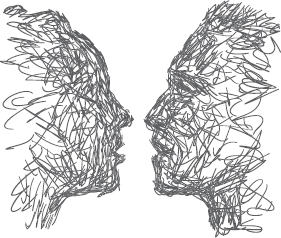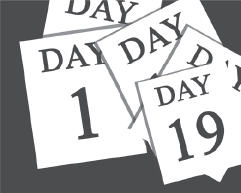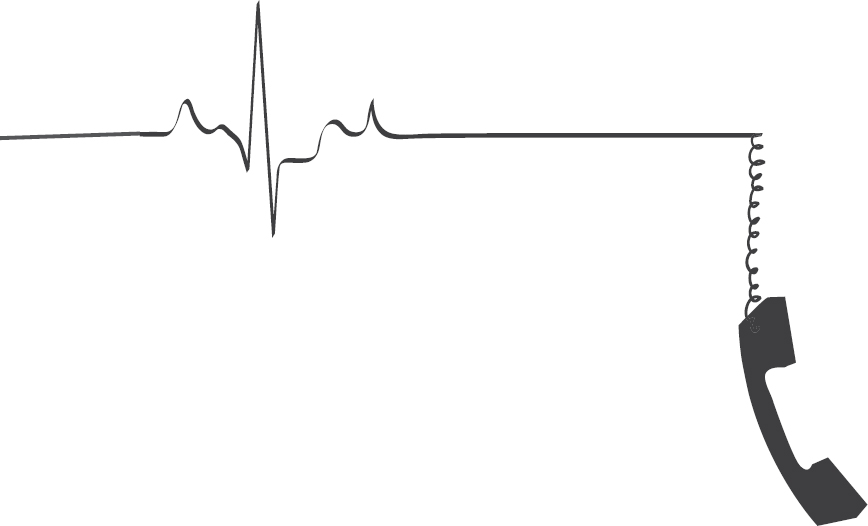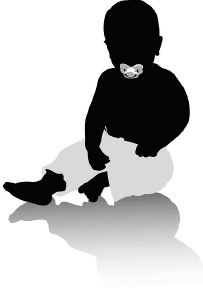
A BUNCH OF PRETTY SMART PEOPLE throughout history think that we are our relationships with other people. Any person as an individual is meaningless, perhaps nonexistent is some senses. We are who we are only in combination with others: lovers, spouses, exes, blood family, in-laws, friends, enemies, neighbors, coworkers, bosses, acquaintances, your dentist, your mechanic, the cashier who rang you up at the grocery store, the guy who flipped you off at the stoplight. We're inherently as formless as water, and all of our relationships comprise the glass that gives us shape. Put another way, we're each a cell in a larger organism, and no cell can survive on its own. Taking this line of thought further, a common thread in mysticism is that there is literally no separation between people; at some level, we're all one. The appearance of a self and others is an illusion here in the maya (the Hindu word for this level of reality). Now, even if you don't subscribe to either of these views, they signal the extreme importance of our interactions with others. Even if you don't think that others are everything that defines us, those relationships are an enormous part of who we are. They involve a huge amount of our time, energy, and brainpower. We're almost always relating to others. Even when we're alone, we're often thinking of others—planning, plotting, fantasizing, mentally replaying conversations. . . . But how to get along with them? What's their significance, how should we treat them, and how should we handle their treatment of us?
Man is a knot, a web, a mesh into
which relationships are tied.
Only those relationships matter.
—Antoine de Saint-Exupéry
No man is an island, entire of itself; every man is a piece of the continent, a part of the main; if a clod be washed away by the sea, Europe is the less, as well as if a promontory were, as well as if a manner of thy friends or thine own were; any man's death diminishes me, because I am involved in mankind. And therefore never send to know for whom the bell tolls; it tolls for thee.
I am a part of all that I have met.
Call it a clan, call it a network, call it a tribe, call it a family: Whatever you call it, whoever you are, you need one.
We are born for cooperation, as are the feet, the hands, the eyelids, and the upper and lower jaws.
The only people for me are the mad ones, the ones who are mad to live, mad to talk, mad to be saved, desirous of everything at the same time, the ones who never yawn or say a commonplace thing, but burn, burn, burn like fabulous yellow roman candles exploding like spiders across the stars and in the middle you see the blue centerlight pop and everybody goes Awww!
When you are in love with humanity, you are satisfied with yourself.
I look upon the whole world as my fatherland, and every war has to me a horror of a family feud. I look upon true patriotism as the brotherhood of man and the service of all to all.
When young, one is confident to be able to build palaces for mankind, but when the time comes one has one's hands full just to be able to remove their trash.
If you want to
change the way people respond to you,
change the way
you respond to people.
Don't take anything personally. Nothing others do is because of you. What others say and do is a projection of their own reality, their own dream.
Nothing is a
greater impediment to
being on good terms
with others than being
ill at ease with yourself.
—Honoré de Balzac
The only common denominator in all your fucked-up relationships is you.
I have perceiv'd that to be with those I like is enough.
There are days when solitude is a heady wine that intoxicates you with freedom, others when it is a bitter tonic, and still others when it is a poison that makes you beat your head against the wall.
The meeting of two personalities is like the contact of two chemical substances. If there is any reaction, both are transformed.

The way to learn whether a person is trustworthy is to trust him.
That which the sober man keeps in his breast, the drunken man lets out at the lips. Astute people, when they want to ascertain a man's true character, make him drunk.
Do not do unto others
as you would expect they should
do unto you. Their tastes
may not be the same.
—George Bernard Shaw
Sorry means you feel the pulse of other people's pain as well as your own, and saying it means you take a share of it. And so it binds us together, makes us trodden and sodden as one another. Sorry is a lot of things. It's a hole refilled. A debt repaid. Sorry is the wake of misdeed. It's the crippling ripple of consequence. Sorry is sadness, just as knowing is sadness. Sorry is sometimes self-pity. But Sorry, really, is not about you. It's theirs to take or leave.
Never ruin an apology with an excuse.
He that cannot forgive others
breaks the bridge over which
he must pass himself, for every man
hath need to be forgiven.
—Edward Herbert, First Baron Herbert of Cherbury
A stiff apology is a second insult. The injured party does not want to be compensated because he has been wronged; he wants to be healed because he has been hurt.
To understand completely is to forgive completely.
If you had never condemned, you would not need to forgive.
Before you embark on a journey of revenge, dig two graves.
The best revenge is to be unlike him who performed the injury.
Do not free a camel of the burden of his hump; you may be freeing him from being a camel.
When I walk into a room, I know that everyone in it loves me. I just don't expect them to realize it yet.
People come into your life for a reason, a season, or a lifetime. When you know which one it is, you will know what to do for that person.
If you hate a person, you hate something in him that is part of yourself. What isn't part of ourselves doesn't disturb us.

Everything that irritates
us about others can lead
us to an understanding of ourselves.
The fault you see in your brother is really in you. The world is a mirror.
I permit no man to narrow and degrade my soul by making me hate him.
Whenever you have trouble with all [group name here], it isn't about [group name here], it's about you. I've found this to be a useful self-diagnostic tool.
I imagine one of the reasons
people cling to their hates so stubbornly is
because they sense, once hate is gone,
they will be forced to deal with pain.
When you know how to listen,
everyone is the guru.
—Ram Dass
Everyone you will ever meet knows something you don't.
When people talk, listen completely. Don't be thinking what you're going to say. Most people never listen.
Three things in human life are important. The first is to be kind. The second is to be kind. And the third is to be kind.
What do we live for, if it is not to make life less difficult for each other?
One of the deep secrets of life is that all that is really worth doing is what we do for others.
If you want others to be happy, practice compassion. If you want to be happy, practice compassion.
What wisdom
can you find
that is greater than
kindness?
Treat the other man's faith gently; it is all he has to believe with. His mind was created for his own thoughts, not yours or mine.
We are all in the same boat in a stormy sea, and we owe each other a terrible loyalty.
We're all going to die, all of us, what a circus! That alone should make us love each other but it doesn't. We are terrorized and flattened by trivialities, we are eaten up by nothing.
A hurtful act is the transference to others of the degradation which we bear in ourselves.
The man who is
brutally honest
enjoys the brutality
quite as much as the honesty.
Possibly more.
—Richard Needham
A truth that's told with bad intent Beats all the lies you can invent.
Try to say nothing negative about anybody for three days, for forty-five days, for three months. See what happens to your life.

Everyone in life is gonna hurt you; you just have to figure out which people are worth the pain.
Never answer an angry word with an angry word. It's the second one that makes the quarrel.
It is very unnerving to be proven wrong, particularly when you are really right and the person who is really wrong is proving you wrong and proving himself, wrongly, right.
The longer we live,
the more we find
we are like other persons.
I judge people by what they might be,—not are, nor will be.
To be good we must needs have suffered; but perhaps it is necessary to have caused suffering before we can become better.
I refuse to make a hierarchy of human actions and ascribe worthiness to some and ill-repute to others. The terms vice and virtue have no signification for me. I do not confer praise or blame: I accept.
You have enemies? Why, it is the story of every man who has done a great deed or created a new idea.
Pay attention to your enemies, for they are the first to discover your mistakes.
If we could read the secret history of our enemies, we should find in each person's life sorrow and suffering enough to disarm all hostility.
Am I not destroying my
enemies when I make friends
of them?
Saints choose to think of everyone as their friend, so that hate does not get in their way.

It's all very well to tell us to forgive our enemies; our enemies can never hurt us very much. But oh, what about forgiving our friends?
As rare as true love is, true friendship is still rarer.
One friend in a lifetime is much; two are many; three are hardly possible.
It's the friends that you can call up at 4 a.m. that matter.
It's no good trying to keep up old friendships. It' painful for both sides. The fact is, one grows out of people, and the only thing is to face it.
The friendships which last are those wherein each friend respects the other's dignity to the point of not really wanting anything from him.
Friendship has splendors that love knows not.

Our perfect companions never have fewer than four feet.
I once had a sparrow alight upon my shoulder for a moment while I was hoeing in a village garden, and I felt that I was more distinguished by that circumstance than I should have been by any epaulet I could have worn.
The animal shall not be measured by man. In a world older and more complete than ours, they move finished and complete, gifted with extension of the senses we have lost or never attained, living by voices we shall never hear. They are not brethren; they are not underlings; they are other nations, caught with ourselves in the net of life and time, fellow prisoners of the splendor and travail of the earth.
We never consider that the things dogs know about us are things of which we have not the faintest notion.
One realizes that even in harmonious families there is this double life: the group life, which is the one we can observe in our neighbour's household, and, underneath, another—secret and passionate and intense—which is the real life that stamps the faces and gives character to the voices of our friends. Always in his mind each member of these social units is escaping, running away, trying to break the net which circumstances and his own affections have woven about him. One realizes that human relationships are the tragic necessity of human life; that they can never be wholly satisfactory, that every ego is half the time greedily seeking them, and half the time pulling away from them. In those simple relationships of loving husband and wife, affectionate sisters, children and grandmother, there are innumerable shades of sweetness and anguish which make up the pattern of our lives day by day.
He that has no fools, knaves, or beggars in his family was begot by a flash of lightning.
Happy or unhappy, families are all mysterious. We have only to imagine how differently we would be described—and will be, after our deaths—by each of the family members who believe they know us.
If you think you're enlightened, go
spend a week with your family.
—Ram Dass
Sibling relationships—and 80 percent of Americans have at least one—outlast marriages, survive the death of parents, resurface after quarrels that would sink any friendship. They flourish in a thousand incarnations of closeness and distance, warmth, loyalty and distrust.
Nobody has ever before asked the nuclear family to live all by itself in a box the way we do. With no relatives, no support, we've put it in an impossible situation.
When I have spoken of my family in the past, there is always someone who wants to know how such love and fury could coexist, and I don't understand the question. Families seem to me to be made of love and fury. The world is mostly water; we are mostly water; life itself is mostly water, but we don't ask how such hydrogen and oxygen can coexist. We just drink it and live.
Family life! The United Nations is
child's play compared to the tugs and
splits and need to understand and
forgive in any family.
—May Sarton
Before I got married I had six theories about bringing up children. Now I have six children and no theories.
We don't yet know, above all, what the world might be like if children were to grow up without being subjected to humiliation, if parents would respect them and take them seriously as people.
The more boring a child is, the more the parents, when showing off the child, receive adulation for being good parents because they have a tame child-creature in their house.
The art of parenting: how constantly to break a lot of bad news—without destroying all confidence and hope.
The reason grandparents and grandchildren get along so well is that they have a common enemy.
Children begin by loving their parents; as they grow older they judge them; sometimes they forgive them.
All parents damage their children. It
cannot be helped. Youth, like pristine glass,
absorbs the prints of its handlers. Some
parents smudge, others crack, a few shatter
childhoods completely into jagged little
pieces, beyond repair.

If you have never been hated
by your child, you have never
been a parent.
The end product of child-raising is not the child but the parent.
If there is anything we wish to change in the child, we should first examine it and see whether it is not something that could be better changed in ourselves.
Adults find pleasure in deceiving a child. They consider it necessary, but they also enjoy it. The children very quickly figure it out and then practice deception themselves.
Children don't need to be taught how to learn; they are born learners. They come out of the womb interacting with and exploring their surroundings. Babies are active learners, their burning curiosity motivating them to learn how the world works. And if they are given a safe, supportive environment, they will continue to learn hungrily and naturally—in the manner and at the speed that suits them best.

There is probably no more terrible instance of enlightenment than the one in which you discover your father is a man—with human flesh.
The fundamental defect of fathers is that they want their children to be a credit to them.
It doesn't matter who my father was; it matters who I remember he was.
The mother-child relationship is paradoxical and, in a sense, tragic. It requires the most intense love on the mother's side, yet this very love must help the child grow away from the mother, and to become fully independent.
A mother never realizes that her children are no longer children.
Other things may change us, but we start and end with the family.